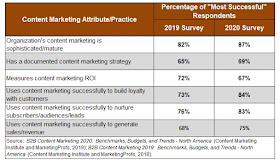The rules of B2B marketing are constantly changing. What worked yesterday won't necessarily work today. . .or tomorrow. This blog presents information, opinion, and speculation about where B2B marketing is headed.
Sunday, November 3, 2019
Two Observations on the New CMI/MarketingProfs Content Marketing Survey
A few days ago, the Content Marketing Institute and MarketingProfs published the findings of their latest content marketing survey. The B2B Content Marketing 2020: Benchmarks, Budgets, and Trends - North America report is based on 679 survey responses from content marketers and marketing executives with B2B companies in North America. All respondents were with companies that have been using content marketing for at least one year.
The annual CMI/MarketingProfs survey has become one of the most popular and widely-cited research studies in the content marketing world. The latest survey has already triggered several articles and blog posts, and I'm sure many more are now being written.
In many ways, the findings from the latest survey echo those in previous versions of the study. For example, they tell us that having a documented content marketing strategy is vital for success, and that top-performing content marketers prioritize the information needs of their audience over their company's promotional messages.
In this post, I'll focus on how some of the attributes of top-performing content marketers have changed since last year's survey, and I'll argue the latest survey shows that most small and mid-size companies should be outsourcing more of their content marketing activities.
Notable Changes in the Attributes of Top Performers
CMI and MarketingProfs provide survey data for both "most successful" and "least successful" content marketers. The survey defines "most successful" marketers as those respondents who characterized their company's content marketing effort as extremely successful or very successful at achieving the company's desired results. "Least successful" marketers are those respondents who described their content marketing program as minimally successful or not at all successful.
The survey report compares most successful to least successful content marketers across several attributes and practices, and as might be expected, there are substantial differences between the two groups. It's also useful to look at how the most successful marketers have evolved over the past year.
The following table depicts how the most successful marketers rated several attributes of their content marketing program in both the latest survey and in last year's survey:
This table shows that in the latest survey, higher percentages of the most successful content marketers reported that their organization's content marketing is sophisticated and/or mature, that they have a documented content marketing strategy, and that they have successfully used content marketing to build loyalty with customers, nurture subscribers, audiences, or leads, and generate revenue.
Somewhat surprisingly, the share of the most successful marketers who said they measure content marketing ROI fell by five percentage points. This could be interpreted as a step backward, but I don't believe that's wholly accurate. I would argue that the change is more likely due to the recognition by sophisticated content marketers that the primary focus of marketing measurement should not be on content marketing per se. Here's my view on this topic.
Small and Mid-Size Companies Underutilize Outsourcing
In this year's survey, half of all respondents said they outsource at least one content marketing activity. However, the use of outsourcing varies greatly depending on company size, as the following chart shows:
Only 37% of respondents from small companies (1-99 employees) said they outsource any content marketing activity, compared to 56% of respondents from mid-size companies (100-999 employees), and 71% of respondents from large companies (1,000+ employees).
These findings suggest that many small and mid-size companies are outsourcing less than they should to optimize their content marketing program. Other findings from the survey show that 44% of small company respondents have no employees working full time on content marketing, and another 29% have only one full time content marketer. More surprising, just over half (53%) of survey respondents from mid-size companies reported having no or only one full time employee dedicated to content marketing.
As the use of content marketing has continued to grow, the competition for buyer attention and mindshare has become more intense. One effect of this heightened competition is that a significant amount of high-quality content has become a prerequisite for content marketing success.
The survey data suggests that many small and mid-size companies aren't committing enough internal resources to create and sustain an effective content marketing program. Under these circumstances, outsourcing some aspects of content marketing - particularly content development - can be a smart and cost-effective way to close the gap.
Top image source: Content Marketing Institute/MarketingProfs



No comments:
Post a Comment